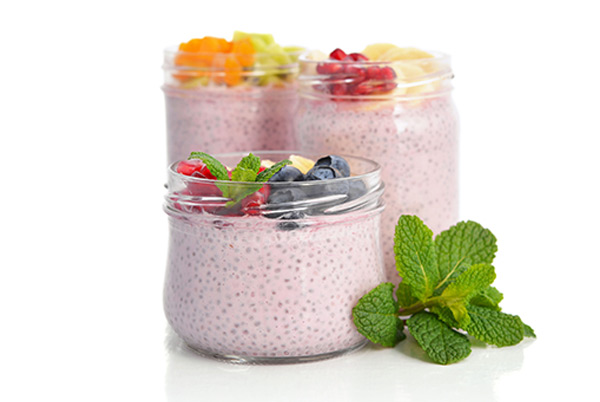
Everyday Superfoods
When you hear the word superfood, do you picture a blueberry wearing a cape made out of kale? Essentially, superfoods have more nutrients than most foods, or they provide particularly large health benefits. Of course, people who are gluten-free have slightly different needs – most of us aren’t getting enough fiber, iron, B vitamins, calcium, magnesium, and more – so some of our superfoods are a little different, too.
Here are my top 11 everyday superfoods:
Ginger
It’s a small root, but it packs a mighty punch! Ginger is a great anti-infammatory food, and has powerful phenols that have the potential to help with arthritis and joint pain, which is very common in the gluten-free community. Animal studies have shown that ginger may help protect against colon and ovarian cancers. It’s also a go-to spice for mamas-to-be, because it can help reduce nausea during morning sickness.
Quick Tip: Add freshly grated ginger to chicken stock for a richer avor. Ginger chews can be an easy and portable support for chronic nausea.
Chia Seeds
Ch-ch-ch-chia! Yes, chia seeds, just like the Chia Pet you had in the 1980s. Chia is a great source of protein, fiber, omega-3s, magnesium, calcium, zinc, and more. Studies have even shown that it may be helpful for heart health and insulin resistance, too. As a bonus, it’s a fantastic egg replacer for people who are vegan or allergic to eggs.
Quick Tip: Make a quick chia pudding by mixing milk or milk alternative, fruit, chia seeds, and sweetener, if desired, and let it sit overnight in the refrigerator.
Turmeric
You’ve probably eaten turmeric before, even if you didn’t know it. Turmeric is the spice that makes curry powder turn yellow. It also has extensive health benefits, and is one of the most well-studied herbs. The main active component of turmeric is curcumin. Curcumin can reduce inflammation in the body, and is regularly used for joint pain, inflammatory bowel disease, and it may help reduce disease activity with cancer, too.
Quick Tip: It’s easy to add turmeric to a wide range of dishes, from roasted veggies to bean or grain dishes.
Kale
Growing up, I was only familiar with kale as a garnish. I was missing out! Kale is one of the best sources of antioxidants, particularly carotenoids and flavonoids, and it’s a great source of fiber, vitamins A, C, and K, and more. It also contains compounds called isothyonites, which may be helpful in lowering the risk of breast, bladder, colon, ovarian, and prostate cancers. As a bonus, kale may help naturally lower cholesterol, too.
Quick Tip: There are so many recipes for kale, from kale chips to kale salads to stews to smoothies. If you have low thyroid function, avoid eating too much raw kale.
Sauerkraut
Q: What can transform a healthy food into a superfood?
A: Fermentation.
Cabbage is impressive on its own, and contains vitamin K, vitamin C, manganese, and an abundance of powerful cancer-fighting antioxidants called polyphenols. But when the cabbage is fermented and made into sauerkraut, it gains helpful probiotics, which are good bacteria. We don’t fully understand everything about the microbiome, or all the bacteria in our gut, but it is clear that the kinds of bacteria in our body have a huge impact on our health. Bacterial imbalance is linked to a higher risk of a wide range of conditions, such as celiac disease, ulcerative colitis, Crohn’s disease, fibromyalgia, multiple sclerosis, and much, much more.
Quick Tip: You can make sauerkraut at home, or you can buy it at many health food stores. The trick is finding a refrigerated brand with no sugar or artificial preservatives. It should contain just cabbage and other veggies, herbs, salt, and water.
Berries
Blueberries, blackberries, raspberries, cranberries, strawberries … oh my!
Blueberries always get all the superfood love, but the rest of the berry family is impressive, too. All berries are low glycemic and extremely high in phytochemicals, and contain lots of vitamin C and fiber. Berries are also good sources of ellagic acid, which has been shown to prevent cancer in animal studies, including breast, skin, bladder, esophageal, and lung cancers. There’s even some research that shows antioxidants in berries may prevent Parkinson’s disease and Alzheimer’s disease. That’s a lot of power for such a small fruit!
Quick Tip: Unless you live somewhere warm all year around, fresh berries have traveled many miles to get to your plate, and lost some nutrients along the way. Frozen berries retain most of those nutrients, and they’re easier to find organically grown, cheaper, and have a much longer shelf life. Add frozen berries to smoothies, yogurt, kefir, or gluten-free oatmeal.
Garlic
Obviously, garlic is a staple and an essential to most cuisines because of its taste. However, garlic has a laundry list of health benefits. It contains allicin, which may help with cardiovascular disease and high blood pressure, and reduce the risk of colon and prostate cancers. Garlic also contains inulin, which is a prebiotic. Probiotics are healthy bacteria, and prebiotics are the food for that healthy bacteria, so garlic can help nourish a healthy gut.
Quick Tip: If you smash a garlic clove with a big knife or the bottom of a glass bottle, it’s easier to peel. Bonus – vampires won’t bother you.
Salmon
Among fish, salmon is king. It’s one of the highest in omega-3 fatty acids, among the lowest in mercury, it contains calcium, and it is a great source of protein. What’s not to love? Omega-3s are linked to improvements in inflammation, including improved cardiovascular function, joint health, eye health, mood, and more. Research suggests that it’s more beneficial to consume omega-3s through foods instead of supplements. Other good options are trout, flounder, sole, sardines, etc.
Quick Tip: Short on time? There are many gluten-free salmon burgers, or consider adding canned salmon to a salad. Most kinds of canned salmon are wild caught. Aim to include fish in your diet twice a week. If you’re allergic to fish or if you are vegan, chia, flax, walnuts, and hemp are plant sources of omega-3s.
Quinoa
Many people assume that quinoa is a grain, but it’s actually a seed. Quinoa is the darling of all vegetarians and vegans for its unique status as a complete protein. It’s a great source of iron, magnesium, fiber, calcium, B vitamins, phosphorus, vitamin E, and potassium, and its health benefits are so significant that NASA studied it and even sent it up to the International Space Station.
Quick Tip: Toast quinoa for a deeper, richer, nuttier flavor.
Cacao and Cocoa Powder
Oh, yes! Raw cacao is very high in antioxidants and flavonoids, which are helpful for blood pressure and circulation. It’s got protein, calcium, B vitamins, magnesium … not bad for something so delicious. Cacao may also help boost levels of feel-good neurotransmitters, like serotonin and theobromine, and give a quick energy boost. For maximum benefits, look for a cacao or raw cocoa powder that is not alkalized.
Notice I said cacao or cocoa, not chocolate. Dark chocolate still has some health benefits, but some of the benefits are lost in the heating process. Milk chocolate is delicious, but unfortunately we can’t pretend it’s a superfood.
Quick Tip: Heat milk or milk alternative, add a spoon of cacao powder, and sweeten with stevia or your sweetener of choice for a warming winter beverage. Bonus points for a sprinkle of cinnamon.
Mesquite Powder
If mesquite gets you thinking of grilling, you’re in the right ballpark. The bark of the mesquite tree is smoked for use in barbecue. However, the mesquite pod is a nutritional gem, and contains several B vitamins, magnesium, calcium, potassium, and a hefty dose of fiber. It’s also delicious, with a molasses or caramel flavor, but with few carbs.
Quick Tip: Add a tablespoon of mesquite to your favorite gluten-free flour blend for added nutrition and flavor. It pairs particularly well with chocolate.
Incorporating these superfoods on a daily or weekly basis is a great way to make sure you are nourishing your body.
As always, consult a medical professional before beginning any new protocol.
 ABOUT THE AUTHOR: Cheryl Harris is an award-winning Registered Dietitian, Nutritionist, and Certified Wellness Coach helping clients learn to live and love a gluten-free lifestyle. She is a contributor to the Washingtonian and Today’s Dietitian and has presented for the FDA, USDA, and many others. Find Cheryl at harriswholehealth.com and gfgoodness.com.
ABOUT THE AUTHOR: Cheryl Harris is an award-winning Registered Dietitian, Nutritionist, and Certified Wellness Coach helping clients learn to live and love a gluten-free lifestyle. She is a contributor to the Washingtonian and Today’s Dietitian and has presented for the FDA, USDA, and many others. Find Cheryl at harriswholehealth.com and gfgoodness.com.



